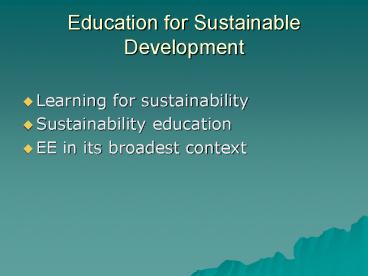Education for Sustainable Development - PowerPoint PPT Presentation
1 / 34
Title: Education for Sustainable Development
1
Education for Sustainable Development
- Learning for sustainability
- Sustainability education
- EE in its broadest context
2
ESD -Why
- A call to action
- A rationale for educational change
- UN Decade 2005-2014
- -to best prepare citizens for active
participation in democratic governance
3
ESD -What
- Knowledge and understanding
- Skills and capabilities
- Perspectives and values
- UN- to develop transdisciplinary understandings
of social, economic and environmental
sustainability
4
ESD -How
- What is the methodology that is consistent with
these goals?
5
Traditional Transitional Spectrum
- Traditional
- learner passive recipient
- subject based
- information transfer
- classroom based
- textbook based
- Workforce preparation and post secondary
preparation
- Transitional
- learner active participant
- integrated/ interdisciplinary
- learner centred concept construction
- linked to and in the world beyond
- real-world sources
- Citizenship preparation
6
Informed by
- NAAEE
- Sustainability literature
- The Center for Ecoliteracy
- Outdoor Education, COEO
- Environment as an Integrating Context work
- Place-Based Learning
- Ontario Ministry of Education policy EE policy
documents - UN ESD
7
The strategies converge with elements of
- Constructivism and brain-based learning
- Multiple intelligences
- Girls and science research
- Boys and reading research
- Authentic Instruction and Assessment
- Retention Studies
- The Whole Child initiative advanced by the ASCD
8
Seven Key Learning Strategies
9
Seven Key Learning Strategies
10
(No Transcript)
11
How do we Connect Learning to the Real World ?
- 1. Hands-on learning (senses)
- 2. Communicate give and get
- -use real sources of information
- -audiences beyond the classroom
- 3. Learn in the context of Issues of Relevance
- -Address real tasks, challenges or
problems - -Case Studies
- 4. Form School-Community Partnerships
12
Inquiry-based Learning
- No longer are we passive receptacles of facts
but actively involved explorers, constantly
interpreting our experiences. Awbrey
and Awbrey, 1995
13
(No Transcript)
14
Making Learning Inquiry-Based?
- Levels Closed/Controlled---Guided ---Open/Free
- Express curriculum in terms of student relevant
key questions - Apply Learning Cycle approaches
- Use Problem-based Learning methods
- Pose Critical Thinking Challenges
- Invite Open Inquiry
15
(No Transcript)
16
Considering Alternative Perspectives in Learning
- Through different subject areas
- Multiple points of view activities
- Using literature and media sources
- Applying temporal perspectives past and future
- Juxtaposing cultural differences
- Designing assessment tasks
17
(No Transcript)
18
Acting on Learning
- Consists of Learning -about action
- -through action
- -from action
- Achieved through
- -Student volunteering activities
- -Service learning
- -Schools walking the talk
19
Sharing Responsibility for Learning with
Students
- When we trust our students to make wise
decisions - and to take control of their education,
- they can and do create change.
- Karen Dockstader-Anderson
20
(No Transcript)
21
Sharing Responsibility for Learning with Students
- Requires
- Authentic, open ended learning tasks
- Teacher as facilitator, coach and master learner
- School facilities for collaborative and self
directed learning - Transparent assessment
- For the Individual Learner Citizen
- Self awareness skills
- Reflection skills
- Self assessment abilities
- For the Learner/Citizen Community
- Collaborative skills
- Group discussion and reflection
- Peer teaching, mentoring and assessment
22
(No Transcript)
23
Using Local ExperiencesThe Community as
Classroom
- Never globalize a problem if it can possibly be
dealt with locally. Gareth Hardin
24
(No Transcript)
25
Using Local ExperiencesThe Community as
Classroom Places for Learning
26
Using Local ExperiencesThe Community as
Classroom
- Field-based pedagogical skills
- Schoolyard naturalization
- Natures calendar of events
- Using appropriate info-tech tools
27
Integrated/Interdisciplinary Learning
- Tug on anything at all and youll find it
connected to everything else in the universe.
John Muir
28
(No Transcript)
29
Levels of Integration
Multidisciplinary -some
Interdisciplinary
Transdisciplinary -most
30
Integrated/Interdisciplinary Learning
- Leading with literature
- Following a concept e.g. relationships
- Project-based learning
- Open inquiry
31
Seven Key Learning Strategies
32
Traditional Transitional Spectrum
- Traditional
- learner passive recipient
- subject based
- information transfer
- classroom based
- textbook based
- Workforce preparation and post secondary
preparation
- Transitional
- learner active participant
- integrated/ interdisciplinary
- learner centred concept construction
- linked to and in the world beyond
- real-world sources
- Citizenship preparation
33
Moving Forward with ESD
- Teachers
- Learning program designers
- Curriculum policy developers
- Pre-service providers
- Professional development agents
34
- Questions and Discussion
- Stan Kozak
- Learning for a Sustainable Future
- skozak_at_sentex.ca

